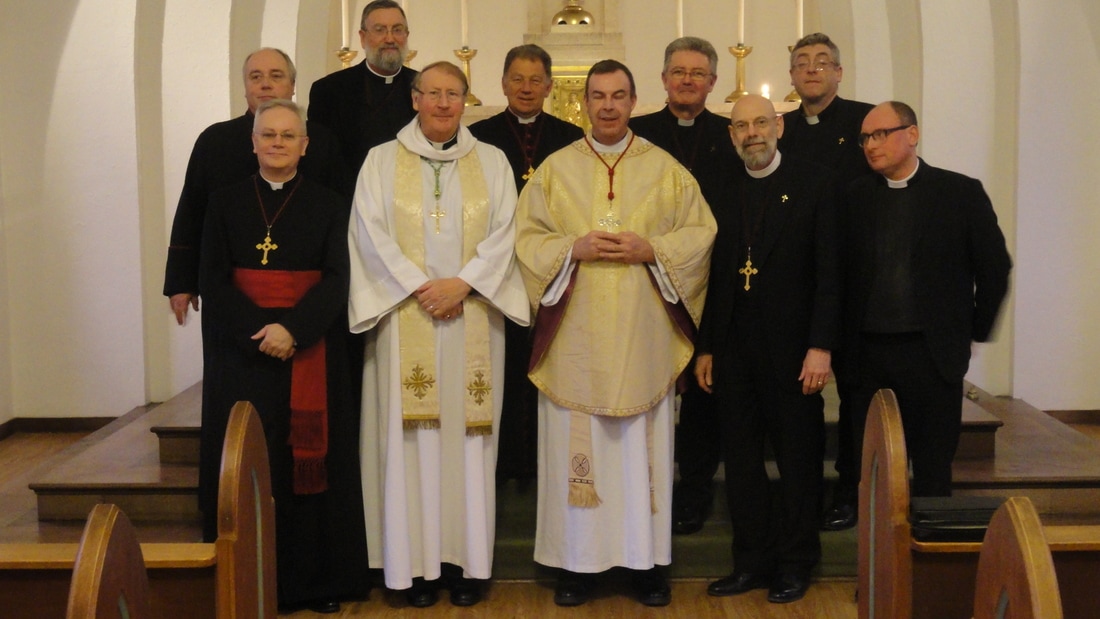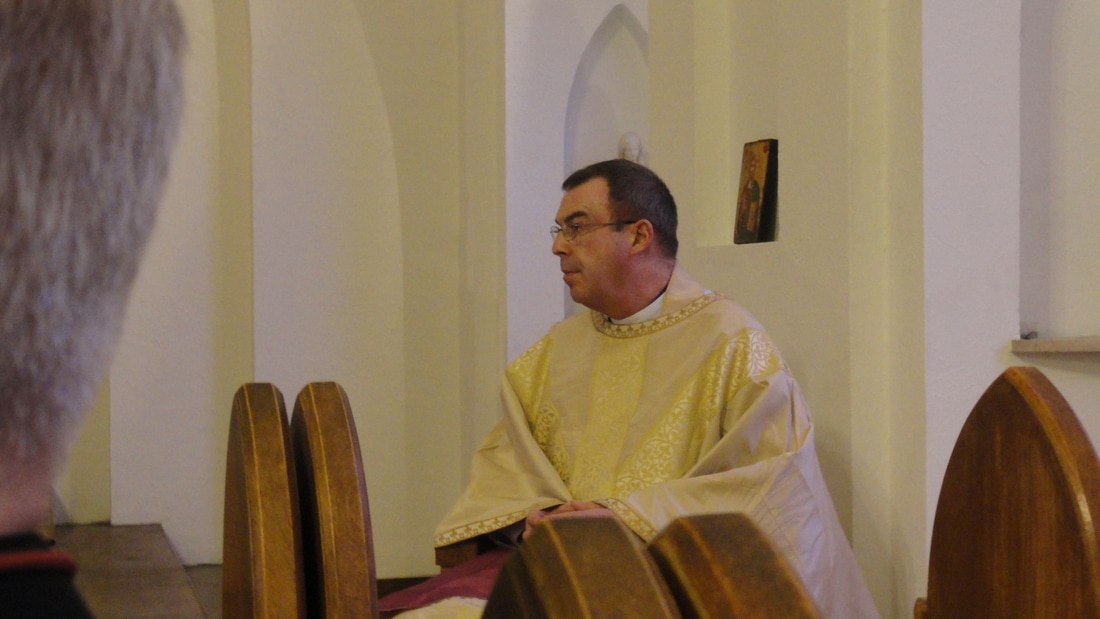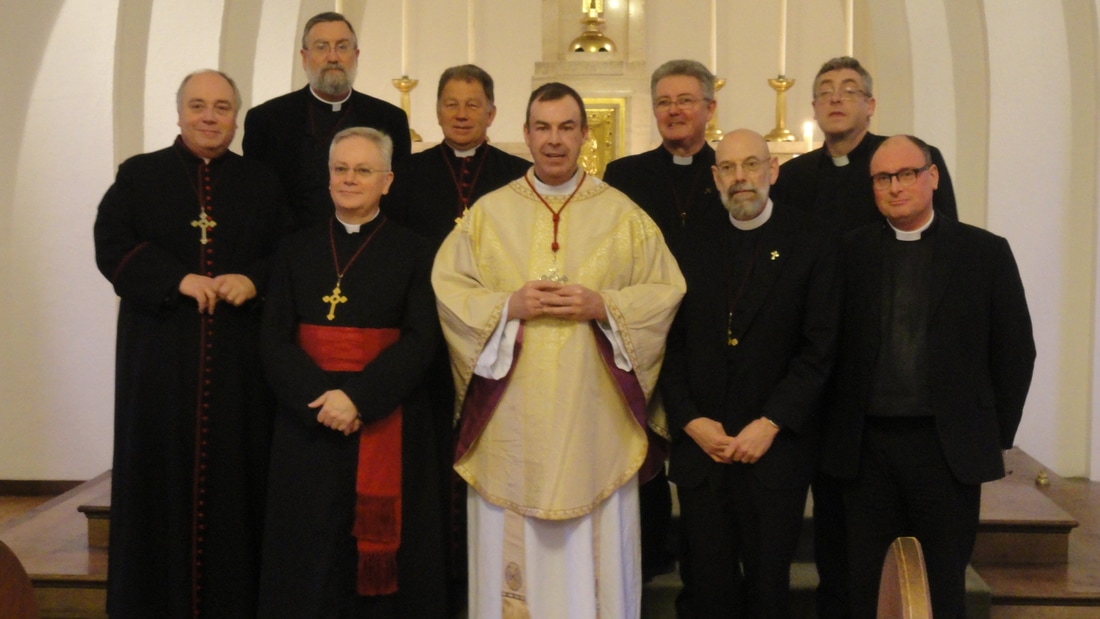A Sermon preached at the SSC General Council
Ascot Priory 8th February 2017
The Holy Cross : Source of Joy
Philippians 3.17-4.1; Mark 8.27-35
Let me begin with two pictures:
In his enthronement address as Bishop of London, David Hope spoke of how, soon after his arrival in the Diocese, he asked to be taken to the top of the dome of St Paul’s. Eventually he found himself at the foot of the cross; the great gold cross which stands at the top of that great cathedral as a witness: a witness to what is central to the Christian faith and life – the death and resurrection of Jesus. Looking out from the foot of the cross, he said, he had a stunning, unique vision of London. It was a vision that made him realise that he needed, in his new ministry, to always see that great city with Christ, from the cross. Not as a secular vision of power and domination, but in the power of Christ’s transcending, suffering love. As he stood there he was reminded of some words of Evelyn Underhill: ‘In the depth of reality, revealed by the cross, Christianity stands alone.’
I grew up in a non-Christian home and came to faith in 1962 through the ministry of a remarkable parish priest, a member of SSC in Southampton, in 1962. It was a time when within the Church of England Anglo-Catholicism seemed to be in the ascendant. The church at large appeared to be becoming more sacramental and Eucharistic across the board; the powerhouses of mission and liturgical renewal were the religious orders and catholic theological colleges – for the most part still theologically orthodox. There was a seriousness about the quest for full visible unity, and the reunification of the Western Church.
Now look around and how easy it so to feel ‘How it has all gone’. In some cases quite literally, friends who have gone to Rome and the Ordinariate, and in some places a whole generation of young Anglo-Catholics slipped away. In South Australia two years ago I presided at a Mass for a small aging group in the parish church, whilst their former parish priest with almost the entire congregation under 40 was now to found in the Roman Catholic church across the road. How easy to be disheartened, even to feel despair. Yet, perhaps in the very loss the Lord is actually bringing is back to something very real. In the depth of reality revealed by the cross, Christianity stands alone.’
But before going further with that, let me go to my second picture: my mother, 92 and succumbing to dementia fast. Last September leading a pilgrimage to the Holy Land, at Mass in the Garden of Gethsemane, I did what I always do at that point, I blessed holding crosses to be carried on the Via Dolorosa, the Way of Cross, that afternoon. Along those for each of the party I blessed two additional ones – for my parents – which I carried for them, giving one to each on my return home. Since then that cross has not left my mother’s side, and in her moments of anxiety and distress, it is to that cross that she turns. She holds it, feels it, looks at it, and in it seems to find some consultation, some peace.
Rock of Ages, cleft for me, Let me hide myself in Thee;
Nothing in my hand I bring, Simply to the cross I cling
St John of the Cross in the 16th century wrote that Jesus achieved more in his motionless silence, dead on the cross, than in the whole of the rest of his his ministry. And he went on to say that when we realise that all that we can do before that cross is to keep silent, and then allow ourselves to be drawn into that silence, the silence of the cross, it is then that we might also find the beginning of global renewal. For the silence, the darkness, is the place where God is allowed to be God, in which the world, descending into its inner chaos, returns to the very moment of creation, when God spoke into the darkness, hovering over the chaos, and bringing life, and order, upon the church
‘In the depth of reality revealed by the cross, Christianity stands alone.’
The past 30 years for many Anglican Catholics have felt like a battle, and one which they have been constantly losing. The forces they have used to defend themselves and advance their cause have, perforce,frequently been those of the secular world: synodical activity, legal action, political activity have all had their part to play. But now is perhaps the time to stand once more where David Hope stood under the cross of St Paul’s, surveying the scene with Christ, from the cross. And facing it not with a secular vision of power and domination, but in the power of Christ’s transcending, suffering love. And that means the power of the cross, and the renewal of life, personal, and corporate to be reshaped in its image.
‘In this sign conquer’ – in those four words are encapsulated the founding vision, and the history, of this Society. Its origin, as you all know, was among a group of priests who had dedicated their lives and their priestly ministry to working, not among the rich and the powerful, but among the poorest of the poor - that they might know the fullness of the Gospel. And so they were formed into a congregation, who would lead a disciplined way of life, uniting themselves under a common rule, dedicated to the work of Mission, and under the patronage of the Cross of Christ. And why this patronage? Because at the altar the priest is drawn wonderfully close to the saving act of Christ And the cross therefore must become a living reality in his life and work.
Here in short is this Society’s charism; for this alone does it exist. And as, I have painfully observed myself quite recently, when a founding charism is lost or neglected, the only outcome can be, indeed probably should be, death.
I first met the Master General, Nicholas, when he was exploring his own priestly vocation and I was his Director of Ordinands, in the Diocese of Coventry. One of the joys of that role was that my working base was the Diocese Retreat House, which some of you may know. It owed it existence to the vision of one man:, the man who ordained me to the priesthood, Cuthbert Bardsley In his day he was in great demand as an evangelist, he was one of the founders of Industrial Mission and was well-known for his ministry to men, but for him the key to this life of engagement was to be found in the careful rhythms of retreat and prayer. When he arrived in Coventry his first act was to rearrange Bishop’s House so that his Chapel and study were right next to one another. He could go in one step from one to the other – prayer informed by the experience of ministry and ministry deeply grounded in the life of prayer. .His purpose in establishing Offa House, as it became, was the same. It was to be the beating heart of prayer for the Diocese, in its chapel was lodged the original cross of nails, that had been carried, parish to parish around the Diocese at the time of the consecration of the new Cathedral calling all to repentance and renewal under the cross of Christ.
But Bishop Cuthbert also knew that buildings on their own do not deliver the purpose for which they were created, the human element, the people who look after them and shape what happens within them are vitally important too. So he brought into the life of the new Cathedral a veritable galaxy of talent to develop to the full that wonderful new place of worship and mission, service and prayer. And similarly care was taken to see that those who shaped the early years of Offa House, as Wardens or as Chairs of the House Committee were chosen with equal care.
Just before stepping down from being Archbishop of Canterbury Rowan Williams reflected on how “Anglicanism at its best has tried to evince the Benedictine values of courtesy, hospitality, generosity and a reflective, practical faith. This vision forms a pearl of great price.” It was certainly a vision embodied, enfleshed, in the ministry of Offa House, over several decades being a spiritual powerhouse, a place of renewal for parishes, and individuals alike, a resource and source of refreshment for clergy at different points on their ministerial path,
But then awareness and attention to the founding charism began to fade. By the time of the celebration of its golden jubilee in 2012, more and more the focus seemed to have become ‘how to keep the house going?’; ‘what would keep the finances sound?’ – no matter what the activity or source of income that became the bottom line. I was asked to preach at the Jubilee Eucharist and in my sermon spoke of both the founding vision, and the consequences of its loss. Looking back at that sermon I see that I quoted St Jerome: ‘a fat belly leads to no fine thought!’
But I also spoke about a prayer that I had first encountered in a retreat in that house and one that needed to be embraced, if the house were to survive. It is that astonishing and powerful Abandonment Prayer of Charles Foucauld written when he was on Retreat in Nazareth over 100 years before, and it sums up exactly that which any Diocesan House of Conference and Retreat must be meant to evoke and sustain. You willall know it:
Father, I abandon myself into your hands;
do with me what you will.
Whatever you may do, I thank you:
I am ready for all, I accept all.
Let only your will be done in me,
and in all your creatures -
I wish no more than this, O Lord.
Into your hands I commend my soul:
I offer it to you with all the love of my heart,
for I love you, Lord, and so need to give myself,
to surrender myself into your hands without reserve,
and with boundless confidence,
for you are my Father. Amen
Sadly, Offa House closed three years later, and in this past month has been put up for sale. Where there is no vision the people perish. Where the founding charism has been lost or forgotten, then there must be death.
Which is where I return to the charism, the vision, of this Society of the Holy Cross. As I look at our world today, as I contemplate our church now, it is a vision, a vocation, that seems to be as relevant, as necessary, as it was ever before. The question is, as always, how is it to be lived and pursued?
Last autumn, in this very chapel, and leading a retreat for some of your brethren, I reflected that before accepting the Master’s invitation to become your Visitor I talked with a number of members of the Society who, I knew and asked them what it meant for them. One said, and not with any particular cynicism, ‘I think it would be fair to say that it is a group of priests bound together by the non-observance of a common rule.’ I went on to say that I very much hoped that this was not so, forthe raison d’etre of any religious order is to be itself a little church – an ecclesiola in ecclesia – a school or laboratory, if you like, within which the disciplines and processes of the formation of the Holy people of God may in microcosm be learned, and practiced, so as then to be more widely disseminated and applied.
And the disciplines and processes of the formation to learned, and practiced, so as then to be more widely disseminated and applied here, among you, are nothing other the marks of a life lived under the cross, reflected as a living reality in personal and corporate life, in prayer and in pastoral practice, in liturgy and in life. A life devoted to enabling others, too, especially the lost, the fallen, those in pain and distress(even, especially, those who persecute and marginalise you), to – like my mother – take hold of the cross and in it find hope and joy. The charism of this Society is to so love priestly life, shaped by the cross, that others cannot but be drawn to that same cross. This is what converted me.
Of course there will always be temptations to focus energies and attention and resources elsewhere. It was ever thus, for as our Gospel told us: ‘When Jesus began to teach them that the Son of Man must undergo great suffering, and be rejected by the elders, Peter took him aside and began to rebuke him. Which then earned the rebuke: ‘Get behind me, Satan! For you are setting your mind not on divine things but on human things.’
In this sign conquer. For so it is, wrote St Paul that: 21He will transform the body of our humiliation so that it may be conformed to the body of his glory
‘In the depth of reality revealed by the cross, Christianity stands alone.’
It is to the living of that reality that you and I are called.
+ Michael Langrish. Visitor
C:\Users\Michael\Documents\Sermons\Special Occasions\SSC Master General's Council 2017 Joy of the Cross.docx



 RSS Feed
RSS Feed